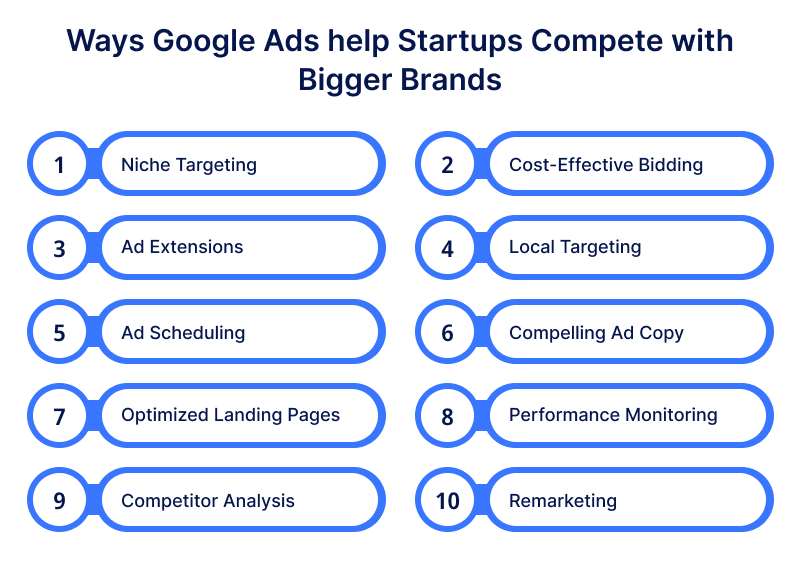Google Ads for Startups: How to Compete with Bigger Brands
Smart Strategies to Maximize Impact on a Startup Budget
Are you curious how startups can compete with industry giants in Google Ads?
While big brands often dominate with hefty budgets and extensive resources, smaller businesses have unique advantages. The challenge for startups is to use these advantages effectively, even with limited funds.
Using Google Ads for startups can be tough, especially when competing with big players with huge money. But don’t worry, there’s a way to level up.
Check our blog post to uncover practical strategies that will help you maximize your Google Ads performance, optimize your budget and make a significant impact, regardless of size.
Understanding Google Ads
Google Ads is a comprehensive digital advertising platform that lets businesses market their goods and services using targeted Internet advertisements. Advertisers can bid on particular keywords to display their advertising to consumers searching for similar topics using a pay-per-click (PPC) model.
Ads are guaranteed to reach the most relevant audience with this system’s exact targeting capabilities based on user behavior, geography and interests.
Key Features of Google Ads
Keyword Targeting: Allows advertisers to show ads based on specific search terms users enter.
Ad Auction System: Uses a bidding process where advertisers compete for ad placement based on keywords.
Cost-Per-Click (CPC): Advertisers pay only when users click on their ad, making it a cost-effective way to drive traffic.
Ad Extensions: To enhance visibility and engagement, add additional information to ads, such as phone numbers, site links, and locations.
Performance Tracking: Provides detailed metrics and analytics to monitor ad performance and optimize campaigns effectively.
How Google Ads for Startups Help New Businesses Compete with Bigger Brands?
It can be challenging for startups to compete with more established, larger businesses through Google Ads, but it is possible with the correct methods. Here are the top 10 essential strategies that Google Ads for startups can use:
1. Niche Targeting
By utilizing Google Ads' potent targeting capabilities, startups can concentrate on particular niches that larger companies might ignore. Startups may make sure the most relevant potential buyers see their advertising by targeting their audience according to specific criteria like interests, demographics, and search behavior.
For example, a new eco-friendly skincare company can effectively compete with established businesses that may target more generalized, larger terms using search terms like "organic face creams" or "sustainable beauty products”.
2. Cost-Effective Bidding
The pay-per-click (PPC) advertising approach used by Google Ads marketing enables entrepreneurs to manage their advertising budget effectively. Startups can attain a strong return on investment without directly competing with established businesses on expensive keywords by beginning with lower bids and concentrating on high-quality, relevant keywords.
For example, a tiny software business offering a specialized productivity app may bid more cheaply on narrow phrases like "time management tools for freelancers" instead of more expensive, general terms like "productivity apps," allowing them to reach a wider audience.
3. Ad Extensions
Google Ads Services provides several extensions to improve an ad's visibility and efficacy while increasing user attractiveness. Startups may add more data, such as call buttons, website links and address information, to give potential customers a more thorough overview of their offer.
For example, a startup online boutique can use site link extensions to highlight different product categories, call extensions to allow direct contact and location extensions to highlight their physical store address. All of these strategies can increase click-through rates and drive higher engagement.
4. Local Targeting
Local targeting is one of the most effective Google Ads marketing techniques for startups. Startups can focus on specific geographic locations where their products or services are most relevant, unlike large brands that typically concentrate on wide-ranging, nationwide campaigns.
This strategy lowers competition while improving the relevance of advertisements for regional audiences, raising conversion rates.
For example, a neighborhood coffee shop might use Google advertisements to target users looking for "coffee near me" within a 5-mile radius. This would guarantee that potential consumers who are local and likely to visit would see their advertisements.
5. Ad Scheduling
Optimizing Google Ads scheduling helps entrepreneurs maximize their spending by controlling when their ads appear. Startups can ensure greater visibility and engagement by scheduling their advertising to show during peak hours and understanding when their target audience is most engaged.
For example, a new company that delivers lunch may plan its advertisements to run in the late morning and early afternoon when individuals are most likely looking for places to eat. Startups that time strategically can get an advantage against more established businesses that might have a different schedule.
6. Compelling Ad Copy
Startups can compete by creating captivating advertising language that appeals to their target market, while larger firms have the financial advantage. Writing compelling advertising content involves more than just pushing a product; it also involves directly addressing the wants and needs of prospective buyers.
For instance, a company that sells environmentally friendly cleaning supplies may use slogans like "Clean Your Home, Protect the Planet—Try Our Eco-Friendly Solutions Today!" to highlight the environmental advantages.
This messaging helps distinguish the firm from bigger rivals who need to be more committed to specialized markets by appealing powerfully to customers who value sustainability highly.
7. Optimized Landing Pages
Start-ups may create an even playing field by developing landing pages specifically catered to their target audience. Startups can also create niche-specific, conversion-focused pages that appeal to their target audience, unlike larger businesses that frequently utilize generic pages.
For example, a firm that sells eco-friendly goods may create a landing page emphasizing sustainable methods, with strong calls to action and a seamless user experience from ad click to purchase. Even on a tighter budget, this focused strategy can raise conversion rates dramatically.
8. Performance Monitoring
Startups must be quick to act on data and possess agility. By regularly monitoring their performance, they can determine what is and is not working with their Google Ads services campaigns in real-time.
For example, fast changes can enhance results if a specific ad group or keyword is underperforming. Unlike established businesses, startups can quickly adjust their approaches and ensure that every dollar spent on advertising is working toward the greatest possible result.
9. Competitor Analysis
Startups can gain great insight from knowing what larger firms do in their Google PPC campaigns. Using tools like Google Ads' Auction Insights, you may find out who your competitors are bidding on comparable keywords and how well your advertisements perform.
For example, a company may decide to change its bidding strategy or concentrate on long-tail keywords that are less competitive but have higher returns on investment if it observes that a major competitor is routinely outranking them for a given phrase. Through strategic targeting, entrepreneurs can outmaneuver more established competitors by focusing on frequently ignored niches.
10. Remarketing
Remarketing enables entrepreneurs to re-engage visitors who have previously connected with their website or advertising, making it one of the most effective tools in Google advertising services.
For example, a well-timed remarketing advertisement can prompt visitors who added an item to their cart but abandoned it to return and complete the transaction. Bigger businesses might reach a wider audience, but startups can target high-intent consumers with remarketing to boost conversion rates without breaking the bank.
This approach optimizes their advertising expenditure's effectiveness while improving customer retention.
Wrapping Up
Google Ads can be a powerful tool for startups competing with larger brands. By leveraging precise targeting, optimizing ad copy, and making data-driven decisions, even the smallest businesses can capture the attention of their ideal audience and drive meaningful results.
Remember to stay agile, test different strategies, and not be afraid to innovate. With the right approach, your Google Ads for startup can compete with bigger players and carve out its unique space in the market.





